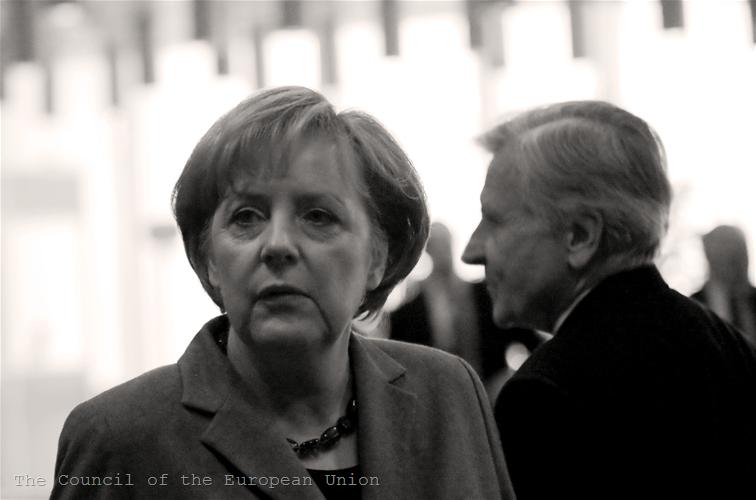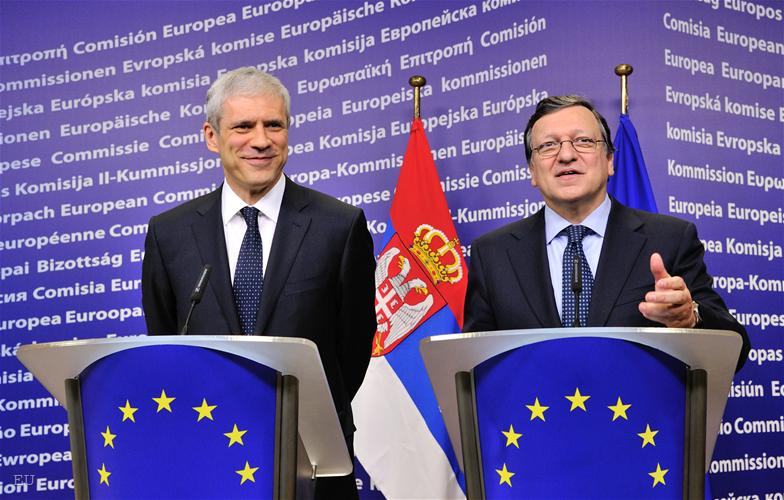Ireland - a Messenger of Spring in the EU
Adelina Marini, March 2, 2012
 If all countries with troubles were like Ireland, probably the bailout programmes, the increasing of the size of eurozone rescue funds, as well as the meetings of the Eurogroup, would not have been in the headlines almost everyday. Against the backdrop of the growing frequent messages of the EU that the situation, although fragile, is improving and there are signs of stabilisation, the fifth review of the Irish rescue programme will obviously serve as an additional boost for the spring mood at the European Council on Thursday and Friday (March 1-2).
If all countries with troubles were like Ireland, probably the bailout programmes, the increasing of the size of eurozone rescue funds, as well as the meetings of the Eurogroup, would not have been in the headlines almost everyday. Against the backdrop of the growing frequent messages of the EU that the situation, although fragile, is improving and there are signs of stabilisation, the fifth review of the Irish rescue programme will obviously serve as an additional boost for the spring mood at the European Council on Thursday and Friday (March 1-2).
The general conclusion of the EU-IMF mission is that Ireland is implementing strictly the programme and this is why it will receive another tranche of the bailout of 5.8 bn euros (from the eurozone rescue fund) and 3.2 bn euros from the IMF. The country will receive another 0.7 bn euros in the form of bilateral loans from Britain, Sweden and Denmark. Thus, the total amount which Ireland has received so far from all these sources is 47.9 bn euros, which is 71% of the overall size of the bailout - 67.5 bn euros.
After all, behind the good results in the fifth review of the implementation of the programme stands the firm determination of the government, and the opposition as well, to apply all the measures so that the country can successfully return to the financial markets as soon as possible - gradually from the second semester of this year and fully next year.
The good news
Ireland's real gross domestic product has returned to positive growth in 2011, when it grew by 0.9%, mainly because of strong exports, assisted by recovery of cost competitiveness. Regretfully, the continuing troubles in the euro area, which have a direct effect on the country's recovery, led to a revision of the autumn forecast of the Commission of growth from 1% to 0.5%. According to the report, this reflects the falling growth of the country's trading partners and especially in the eurozone. In spite of these not very optimistic data, the EU-IMF mission thinks that the government's ambition to  achieve its targets for nominal growth this year remains valid because the devaluation of the euro against the dollar (a drop by around 3% in the last three months) will have positive impact on exports.
achieve its targets for nominal growth this year remains valid because the devaluation of the euro against the dollar (a drop by around 3% in the last three months) will have positive impact on exports.
Ireland managed to fit into the target for 2011 of budget deficit of 10.6% and even performed better than expected by scoring 10 per cent deficit. The ceiling for this year is 8.6% as there are good grounds to think that the target can be met. The programme is striving to reduce the deficit below the 3% of GDP threshold by 2015, which is the norm in the European legislation.
Significant progress is registered regarding the return to health of the banking system. In general the recapitalisation of banks is complete. Relying on funding from the Eurosystem (the system of eurozone countries central banks) is diminishing. From the peak of 154 bn euros in February last year, in the end of December 2011 the banks relied on funding from the central bank of 109 bn euros, which is below the forecast.
There are good news in terms of the price of the 10-year Irish bonds, which have reached their lowest price since the beginning of the programme. Moreover, the report says, while some euro area member states suffered a downgrade of their credit rating in January, the Irish rating remained unchanged by two credit rating agencies.
The risks
In spite the significant progress, many risks lie ahead for the Irish recovery. The main challenges are related to the danger of continued tensions on the financial markets, as well as by increasing the problems with the financing of banks. The data for the domestic demand in Ireland are also not very good, and additional weakening is expected which will have negative effect on budget implementation and might have a spillover effect on the economic growth.
The situation with employment is also not very good. Employment has dropped by 2.5% as the demand for workers on the domestic market is continuing to fall. It is noted, however, that the outward migration have contained a more serious deterioration of the situation on the labour market. Unemployment rate was 14.2% in 2011. The upcoming lay-offs of public employees is expected to contribute further to the growing number of unemployed. The government has depleted its possibilities to cut budget spending for public employees wages after gross rates of public service pay were reduced by about 14% cumulatively over 2009 and 2010 through the application of a public service specific levy. This is why now the government has to start reducing real jobs.
By 2015 it is expected the number of public employees to be reduced to 282 500 or with 23 500 fewer than at the end of 2010. This will contribute to cutting this type of spending by 2.5 bn euros or by 15%.
Against the backdrop of the painful two months during which the negotiations on the second bailout programme for Greece were taking place, as well as the negotiations for Greek debt haircut with private creditors, the Irish data are more than good. Ireland can be perceived a messenger of spring for the spring European Council and is an argument against the position of those who think that the austerity programmes do not deliver. Yesterday, this thesis was expressed again, this time by Bernadette Segol, Secretary General of the European Trade Unions Confederation after the Trilateral Social summit, which usually precedes the meetings of the European Councils. She stigmatised as unsuccessful all austerity programmes - the Greek, the Portuguese and the Irish.
 The achievements of the government in Dublin, however, obviously give good reasons to Premier Enda Kenny to be self-confident and even to lobby for the combining of the resources of the temporary rescue fund with the permanent one to achieve a combined lending capacity of 750 bn euros, which is a major demand of EU's external partners (G20). Some EU member states also insist for the same, asking for guarantees that they will receive assistance if, because of the not good economic perspectives, their situation would deteriorate. Putting aside the fact that Enda Kenny has solid grounds to ask this, the stakes for the country are also very high - unless finally the stability of the eurozone is guaranteed, the enviable recovery of Ireland would fail. And if there are rumours that Portugal might request a second bailout (denied both by Lisbon and Brussels), because of the bad economic perspectives (negative growth of 3.3% for 2012), for Ireland failure would be really not deserved.
The achievements of the government in Dublin, however, obviously give good reasons to Premier Enda Kenny to be self-confident and even to lobby for the combining of the resources of the temporary rescue fund with the permanent one to achieve a combined lending capacity of 750 bn euros, which is a major demand of EU's external partners (G20). Some EU member states also insist for the same, asking for guarantees that they will receive assistance if, because of the not good economic perspectives, their situation would deteriorate. Putting aside the fact that Enda Kenny has solid grounds to ask this, the stakes for the country are also very high - unless finally the stability of the eurozone is guaranteed, the enviable recovery of Ireland would fail. And if there are rumours that Portugal might request a second bailout (denied both by Lisbon and Brussels), because of the bad economic perspectives (negative growth of 3.3% for 2012), for Ireland failure would be really not deserved.
 | © The Council of the European Union
| © The Council of the European Union | © The Council of the European Union
| © The Council of the European Union | © EU
| © EU